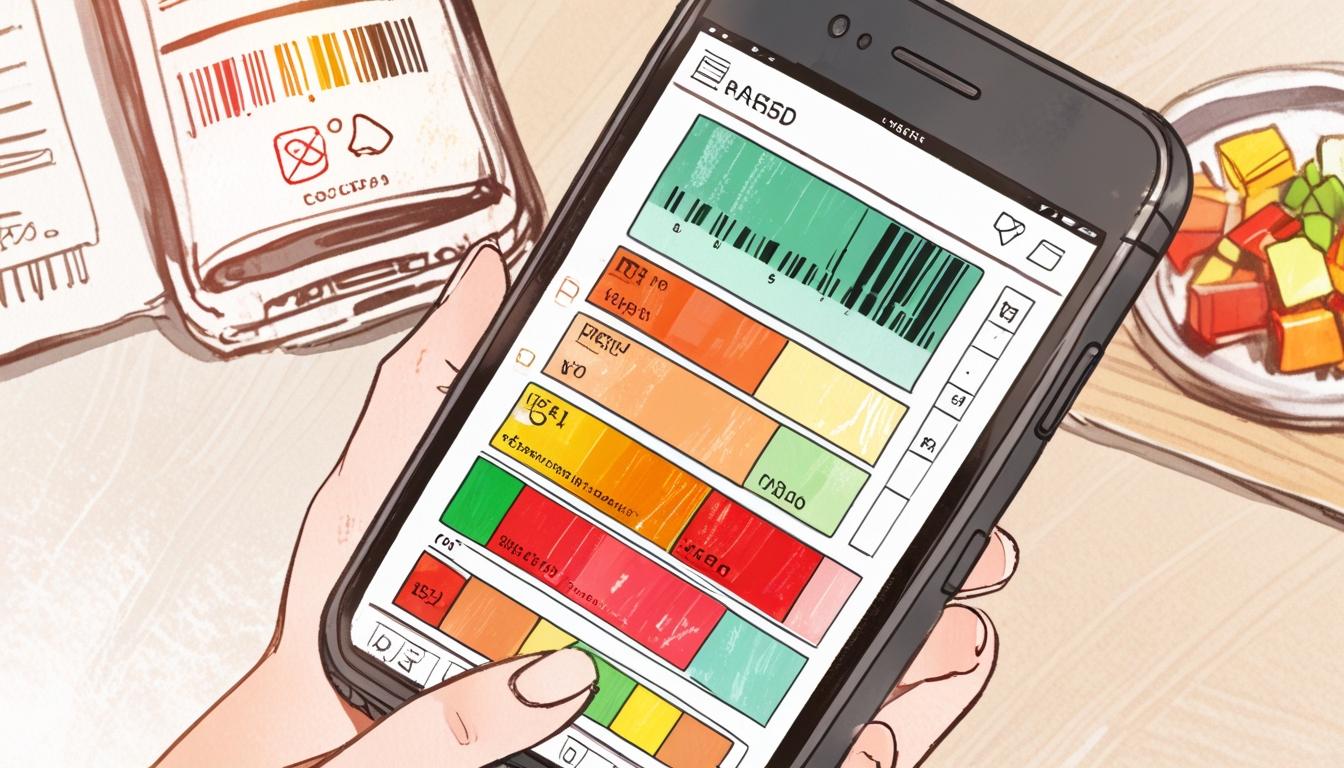The popular app Yuka, which rates food and cosmetic products for healthiness, has raised concerns about the accuracy of its additive warnings and the potential for increased consumer anxiety amid growing scrutiny of ultra-processed foods.
In recent months, the free mobile app Yuka has gained popularity among consumers keen on assessing the healthiness of their food and cosmetic products. The app allows users to scan barcodes, providing in-depth information about the items they are considering for purchase. While it makes recommendations for healthier alternatives, it has sparked a debate about the reliability of its data and potential effects on consumer behaviour.
Users of Yuka input products, from oat milk to toothpaste, and receive health ratings based on a combination of additives, nutritional content, and potential health risks. For instance, one user discovered that their children’s fish fingers contained a texturising agent associated with an increased risk of breast cancer and other health issues. Similarly, the app identified additives in various products that were alarming, such as titanium dioxide, banned in the EU as a food additive due to its potential carcinogenic properties.
The app’s ratings employ a colour system: red signifies a bad score, amber represents poor, while shades of green indicate good and excellent. These ratings have prompted some users to discard numerous items from their kitchens and bathrooms, questioning the safety of commonly used products. For instance, the user noted that their previously harmless-seeming pink antibacterial hand soap was flagged for containing octinoxate, suspected of being an endocrine disruptor.
Interest in apps like Yuka has surged as public scrutiny of ultra-processed foods grows. A study published in the American Journal of Preventive Medicine estimated that nearly 18,000 premature deaths in the UK were attributed to the consumption of such foods. The increasing unease surrounding food safety was further highlighted by a recent BBC Panorama report that scrutinised baby food pouches from leading brands, revealing dangerously high sugar levels.
However, critics highlight potential downsides to this obsession with product scanning. Some health experts caution that relying too heavily on these apps can create unnecessary anxiety about food choices—what some describe as a “clean eating” obsession. For example, Dr Alex Richardson, an expert in child nutrition, noted that while some additives may pose concerns, the focus should remain on the nutritional value of foods rather than succumbing to fear-based marketing tactics.
The Yuka app claims to derive its assessments from evidence provided by various health authorities, including the European Food Safety Authority and the World Health Organisation. Users, however, express doubts about the algorithms that underpin the scoring system, questioning whether the removal of products based solely on the presence of certain additives is justified. Critics contend that the lack of detail regarding the quantity of these additives detracts from the utility of the app.
A Yuka spokesperson defended the app’s approach, asserting that it aims to empower consumers with accessible information rather than instilling fear. According to them, the app encourages users to make more informed decisions by recommending healthier alternatives while basing its assessments on scientific studies and collective assessment reports.
Nonetheless, experts like Dr Kremlin Wickramasinghe from the WHO caution against singular reliance on one app or scoring system, noting that many are developed by industry stakeholders with potential biases. There is also concern about the variability of these apps across different countries and the absence of a universal framework for assessing nutritional quality.
Looking ahead, health professionals, including Dr Caroline Taylor from the University of Bristol, suggest that moderation is key. They argue that portion sizes and frequency of consumption ultimately dictate the healthfulness of a product.
As users like the aforementioned parent navigate the fine line between informed choices and overzealous scrutiny, the overarching question remains: how useful are such apps in making dietary decisions? While Yuka and its competitors may provide guidance, experts agree that a balanced perspective—and perhaps a return to cooking from scratch—may still be the best approach for health-conscious consumers.
Source: Noah Wire Services
- https://www.wired.com/story/yuka-app/ – This article discusses how the Yuka app provides health ratings for food and cosmetic products, including its color-coded scoring system and the impact on consumer purchasing decisions.
- https://www.wired.com/story/yuka-app/ – The piece highlights concerns about the Yuka app’s potential to create unnecessary anxiety among consumers due to its emphasis on certain additives and chemicals.
- https://www.wired.com/story/yuka-app/ – The article mentions that Yuka’s ratings for food products are based on the Nutri-Score, a system used in many European countries, including France.
- https://www.wired.com/story/yuka-app/ – The article notes that Yuka’s ratings for cosmetics are based on scientific research, though they lack an independent framework like the Nutri-Score.
- https://www.wired.com/story/yuka-app/ – The article discusses how Yuka’s evaluations have led consumers to question the safety of commonly used products, such as antibacterial hand soaps containing certain additives.
- https://www.wired.com/story/yuka-app/ – The article mentions that Yuka’s ratings have prompted users to discard numerous items from their kitchens and bathrooms, questioning the safety of commonly used products.
- https://news.google.com/rss/articles/CBMiiAFBVV95cUxON1VWejZxbGRQM0cyNlBRRVZOdUtYeGZNY2NySld0V2RBTDBfU3gyUEo2bko3OV91YVdwOWIxQmVFX3Y5Zms5bEk2bFZzWHBBTWFPTi1tVG9wTFJ3OXVnS0M0M0R1YVdnSHFGZ194Vl94QzdUanRWWkFWQVQyRjliaHRaUmlrdlpo?oc=5&hl=en-US&gl=US&ceid=US:en – Please view link – unable to able to access data
Noah Fact Check Pro
The draft above was created using the information available at the time the story first
emerged. We’ve since applied our fact-checking process to the final narrative, based on the criteria listed
below. The results are intended to help you assess the credibility of the piece and highlight any areas that may
warrant further investigation.
Freshness check
Score:
8
Notes:
The narrative discusses contemporary trends and concerns, such as the surge in ultra-processed food scrutiny and recent BBC reports on baby food. The mention of ongoing debates and recent studies suggests the content is relatively fresh. However, specific dates within the narrative could not be verified.
Quotes check
Score:
6
Notes:
There are quotes from Dr Alex Richardson and concerns from experts like Dr Kremlin Wickramasinghe. Without specific sources or dates for these quotes, it’s difficult to verify their original context, though they seem to be expert opinions rather than direct lifts from previous articles.
Source reliability
Score:
5
Notes:
The narrative references reputable sources such as the European Food Safety Authority and the World Health Organisation but lacks detailed citations. While the origins of the narrative are unclear, the references to established health authorities suggest some level of credibility.
Plausability check
Score:
8
Notes:
The claims about the Yuka app and concerns over food additives are plausible given public interest in health and nutrition. However, the criticism about over-reliance on apps and lack of detailed information on some additives raises questions about the app’s effectiveness.
Overall assessment
Verdict (FAIL, OPEN, PASS): OPEN
Confidence (LOW, MEDIUM, HIGH): MEDIUM
Summary:
The narrative is plausible and discusses contemporary issues in health and nutrition. However, the lack of specific sources for quotes and the narrative’s origin reduces confidence in its reliability. While reputable health authorities are referenced, concerns about the app’s methodology and breadth of information remain.













